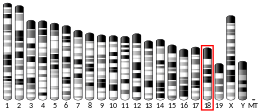Dihydropyrimidinase-related protein 3 is an enzyme that in humans is encoded by the DPYSL3 gene.[5][6][7] A recent bioinformatics study suggested that the DPYSL3 gene might have a prognostic role in neuroblastoma.[8]
References
edit- ^ a b c GRCh38: Ensembl release 89: ENSG00000113657 – Ensembl, May 2017
- ^ a b c GRCm38: Ensembl release 89: ENSMUSG00000024501 – Ensembl, May 2017
- ^ "Human PubMed Reference:". National Center for Biotechnology Information, U.S. National Library of Medicine.
- ^ "Mouse PubMed Reference:". National Center for Biotechnology Information, U.S. National Library of Medicine.
- ^ Hamajima N, Matsuda K, Sakata S, Tamaki N, Sasaki M, Nonaka M (November 1996). "A novel gene family defined by human dihydropyrimidinase and three related proteins with differential tissue distribution". Gene. 180 (1–2): 157–163. doi:10.1016/S0378-1119(96)00445-3. PMID 8973361.
- ^ Gaetano C, Matsuo T, Thiele CJ (May 1997). "Identification and characterization of a retinoic acid-regulated human homologue of the unc-33-like phosphoprotein gene (hUlip) from neuroblastoma cells". The Journal of Biological Chemistry. 272 (18): 12195–12201. doi:10.1074/jbc.272.18.12195. PMID 9115293.
- ^ "Entrez Gene: DPYSL3 dihydropyrimidinase-like 3".
Further reading
edit- Dawson SJ, White LA (May 1992). "Treatment of Haemophilus aphrophilus endocarditis with ciprofloxacin". The Journal of Infection. 24 (3): 317–320. doi:10.1016/S0163-4453(05)80037-4. PMID 1602151.
- Inagaki H, Kato Y, Hamajima N, Nonaka M, Sasaki M, Eimoto T (January 2000). "Differential expression of dihydropyrimidinase-related protein genes in developing and adult enteric nervous system". Histochemistry and Cell Biology. 113 (1): 37–41. doi:10.1007/s004180050005. PMID 10664068. S2CID 11121195.
- Matsuo T, Stauffer JK, Walker RL, Meltzer P, Thiele CJ (June 2000). "Structure and promoter analysis of the human unc-33-like phosphoprotein gene. E-box required for maximal expression in neuroblastoma and myoblasts". The Journal of Biological Chemistry. 275 (22): 16560–16568. doi:10.1074/jbc.M001312200. PMID 10748015.
- Fukada M, Watakabe I, Yuasa-Kawada J, Kawachi H, Kuroiwa A, Matsuda Y, Noda M (December 2000). "Molecular characterization of CRMP5, a novel member of the collapsin response mediator protein family". The Journal of Biological Chemistry. 275 (48): 37957–37965. doi:10.1074/jbc.M003277200. PMID 10956643.
- Weitzdoerfer R, Fountoulakis M, Lubec G (2001). "Aberrant expression of dihydropyrimidinase related proteins-2,-3 and -4 in fetal Down Syndrome brain". Protein Expression in Down Syndrome Brain. pp. 95–107. doi:10.1007/978-3-7091-6262-0_8. ISBN 978-3-211-83704-7. PMID 11771764.
{{cite book}}:|journal=ignored (help) - Franken S, Junghans U, Rosslenbroich V, Baader SL, Hoffmann R, Gieselmann V, et al. (January 2003). "Collapsin response mediator proteins of neonatal rat brain interact with chondroitin sulfate". The Journal of Biological Chemistry. 278 (5): 3241–3250. doi:10.1074/jbc.M210181200. PMID 12444086.
- Rosslenbroich V, Dai L, Franken S, Gehrke M, Junghans U, Gieselmann V, Kappler J (May 2003). "Subcellular localization of collapsin response mediator proteins to lipid rafts". Biochemical and Biophysical Research Communications. 305 (2): 392–399. doi:10.1016/S0006-291X(03)00754-X. PMID 12745088.
- Ballif BA, Villén J, Beausoleil SA, Schwartz D, Gygi SP (November 2004). "Phosphoproteomic analysis of the developing mouse brain". Molecular & Cellular Proteomics. 3 (11): 1093–1101. doi:10.1074/mcp.M400085-MCP200. PMID 15345747.
- Choi YL, Kim CJ, Matsuo T, Gaetano C, Falconi R, Suh YL, et al. (May 2005). "HUlip, a human homologue of unc-33-like phosphoprotein of Caenorhabditis elegans; Immunohistochemical localization in the developing human brain and patterns of expression in nervous system tumors". Journal of Neuro-Oncology. 73 (1): 19–27. doi:10.1007/s11060-004-3013-3. PMID 15933812. S2CID 25655752.
- Cole AR, Causeret F, Yadirgi G, Hastie CJ, McLauchlan H, McManus EJ, et al. (June 2006). "Distinct priming kinases contribute to differential regulation of collapsin response mediator proteins by glycogen synthase kinase-3 in vivo". The Journal of Biological Chemistry. 281 (24): 16591–16598. doi:10.1074/jbc.M513344200. PMC 1805471. PMID 16611631.
- Olsen JV, Blagoev B, Gnad F, Macek B, Kumar C, Mortensen P, Mann M (November 2006). "Global, in vivo, and site-specific phosphorylation dynamics in signaling networks". Cell. 127 (3): 635–648. doi:10.1016/j.cell.2006.09.026. PMID 17081983. S2CID 7827573.
- Chicco D, Sanavia T, Jurman G (March 2023). "Signature literature review reveals AHCY, DPYSL3, and NME1 as the most recurrent prognostic genes for neuroblastoma". BioData Mining. 16 (1): 7. doi:10.1186/s13040-023-00325-1. eISSN 1756-0381. PMC 9985261. PMID 36870971.





